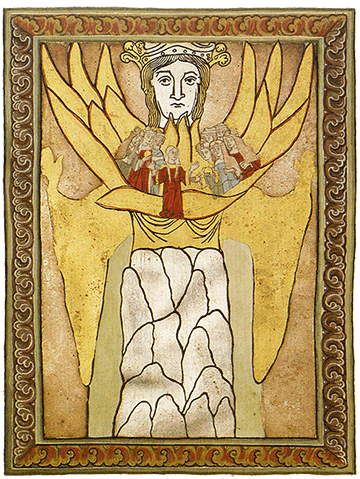 In the year 1106 a small and sickly 8-year-old girl was deposited with the
monks at Disibodenberg monastery. Her name was Hildegard, and she had been
gifted at birth to the Church for life by pious parents intending, no doubt, to
make certain their tenth surviving child would have food and a roof for life.
They would also have had reason to believe that such a gift to the Church would
ensure their own chances of a place in Heaven come Judgment Day! They could not
have been imagined, in 1106, that this diminutive female would become anything
more than an anonymous resident of the cloister. But by her death in 1179, at
age 81, Hildegard von Bingen had become one of the most renowned and respected
figures in the medieval world. She achieved in her own lifetime a world
fame that has endured across more than eight centuries, and left for us an
astonishing body of works in literature, art, music, philosophy and even
natural science.
In the year 1106 a small and sickly 8-year-old girl was deposited with the
monks at Disibodenberg monastery. Her name was Hildegard, and she had been
gifted at birth to the Church for life by pious parents intending, no doubt, to
make certain their tenth surviving child would have food and a roof for life.
They would also have had reason to believe that such a gift to the Church would
ensure their own chances of a place in Heaven come Judgment Day! They could not
have been imagined, in 1106, that this diminutive female would become anything
more than an anonymous resident of the cloister. But by her death in 1179, at
age 81, Hildegard von Bingen had become one of the most renowned and respected
figures in the medieval world. She achieved in her own lifetime a world
fame that has endured across more than eight centuries, and left for us an
astonishing body of works in literature, art, music, philosophy and even
natural science.
Hildegard was always strange: she was sickly, and subject lifelong to episodes of luminous visions – now generally thought to be the result of migraines – that began as early as age three. Hildegard learned young the wisdom of keeping mum about these visions, and for more than half her life, even in the cloister, she kept them very private. But in 1141, after she had been cloistered for more than 30 years, Hildegard describes a particularly powerful vision:
And it came to pass ... when I was 42 years and 7 months old, that the heavens were opened and a blinding light of exceptional brilliance flowed through my entire brain. And so it kindled my whole heart and breast like a flame, not burning but warming... and suddenly I understood of the meaning of expositions of the books...
Having been granted instant and perfect understanding of these religious texts, Hildegard is commanded to share that understanding with others by writing down all that she observes in her visions. It would have been an agonizing time for Hildegard. For a mere woman of the cloister to put herself forward on matters of religious doctrine would have been unheard of, and it would have been in direct conflict with Hildegard's oath of humility to the Church and her cloister. But in the end, Hildegard heeded the powerful call to write and, although it required papal imprimatur, she was able to finish her first visionary work, Scivias (Know the Ways of the Lord).
Thus did Hildegard von Bingen become known as a visionary and a mystic. This, to the medieval mind, was all the “street cred” she needed to be taken seriously by both religious and secular authorities, and her fame began to spread throughout Germany and beyond. Hildegard was also strongly individual, and she brought an iron will and a unique grasp of the art of political persuasion. In an age when women could expect to be treated as chattel, she became a figure of spiritual and political influence, sought-after advisor to popes, bishops, and kings.
Visionary, mystic, poet, artist, philosopher and naturalist, Hildegard was also a prolific composer – the first composer whose biography is known. Her surviving oeuvre includes major writings on theology, treatises on medicinal botany and natural history, mystical and visionary writings, manuscript illuminations and numerous compositions of sacred music that include chant and musical plays. Of these, music was perhaps the most important to Hildegard. She believed music captured the original joy and beauty of Paradise, and her works – hymns and sequences in honor of saints and the Virgin Mary – were in the plainchant tradition, often set to her own writings, which were particularly metaphorical and visionary, imbued with vibrant color and light.
Amuse Singers, a small ensemble of women's voices under the musical direction of Stephen M. Black, will open their 2014-2015 Season with "Hildegard, Then and Now", an evening of original chant by Hildegard von Bingen, as well as works by composers inspired by Hildegard's music and writings. Come join us on Saturday, September 27, 7:30 PM, at the Church of St. Ignatius of Antioch, West 87th Street between Broadway and West End Avenue, when we take a look at the works of one of the most intriguing, celebrated and influential women of the 12th century, and examine how profoundly Hildegard's literary, musical, and philosophical legacy has influenced the works of composers to this day. For details, visit www.amusesingers.org.
Shirley Pompura sings with Amuse Singers.
